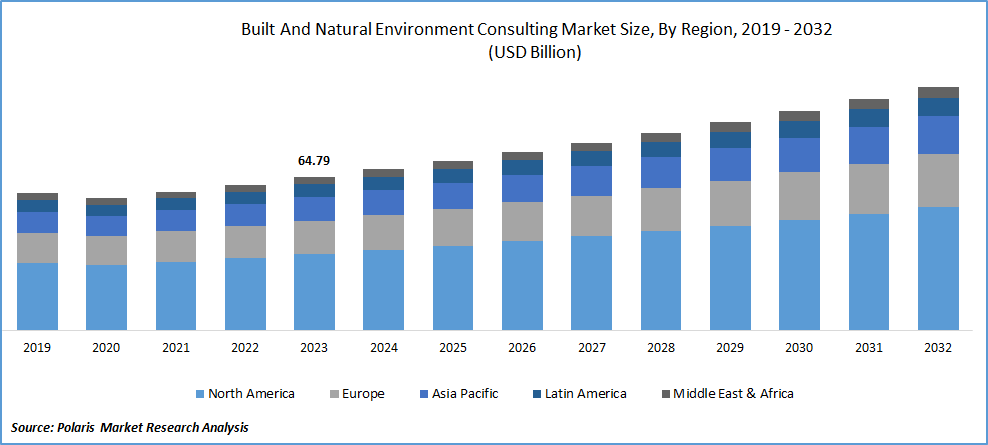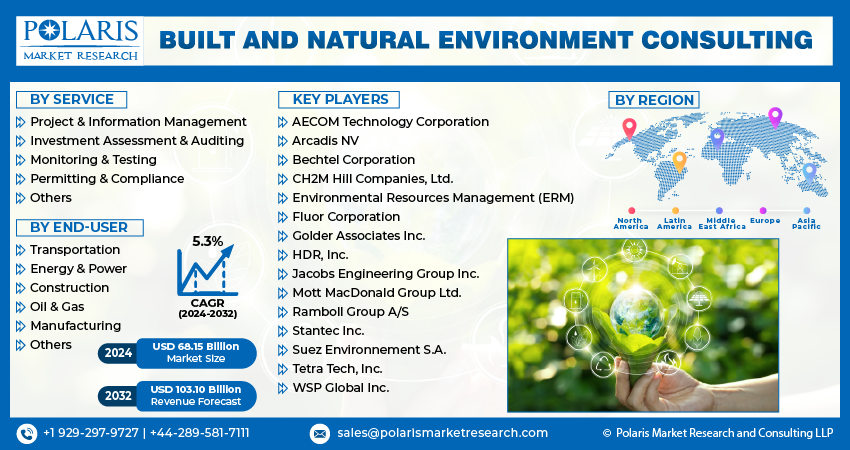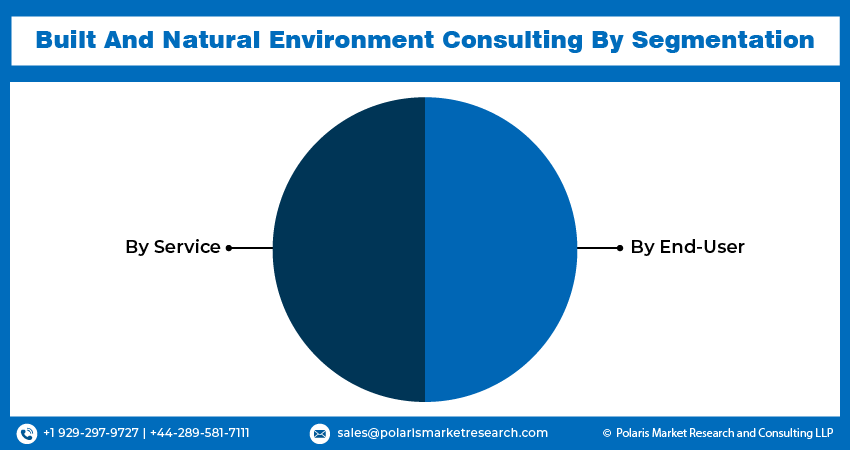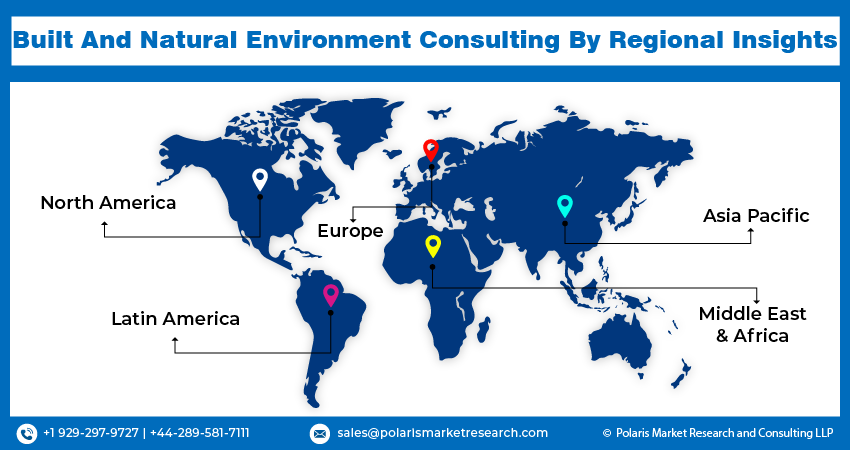
Built and Natural Environment Consulting Market Share, Size, Trends, Industry Analysis Report, By Service (Project & Information Management, Investment Assessment & Auditing, Monitoring & Testing, Permitting & Compliance and Others); By End-User; By Region; Segment Forecast, 2024- 2032
- Published Date:Mar-2024
- Pages: 115
- Format: PDF
- Report ID: PM4721
- Base Year: 2023
- Historical Data: 2019-2022
Report Outlook
The global built and natural environment consulting market was valued at USD 64.79 billion in 2023 and is expected to grow at a CAGR of 5.3% during the forecast period.
The built and natural environment consulting market has emerged as a critical player in driving sustainable development worldwide. This specialized sector operates at the intersection of human-made infrastructure and the natural world, providing expertise in managing environmental impacts associated with various projects and developments.
The built and natural environment consulting market encompasses a diverse range of services, catering to both the public and private sectors. Its core offerings revolve around environmental assessments, regulatory compliance, sustainability consulting, and project management. These services are instrumental in guiding clients through the intricate process of navigating environmental considerations while pursuing their development goals.

To Understand More About this Research:Request a Free Sample Report
- For instance, in May 2023, Matrix New World entered into a partnership with True Environmental. This was undertaken to provide capital solutions to expedite growth and facilitate ownership transitions. This partnership marks a significant stride in True's endeavor to establish a platform for nurturing and expanding enterprises within the environmental consulting and engineering sector.
However, the built and natural environment consulting sector maintains strong growth, it encounters specific challenges. These encompass adeptly maneuvering through intricate regulatory frameworks, ensuring precise data acquisition, and harmonizing economic development considerations with environmental conservation.
Furthermore, the market stands poised for extended expansion. The escalating urgency of climate change mitigation, combined with an increasing emphasis on sustainable practices, will sustain the demand for the specialized expertise offered by built and natural environment consulting firms. Furthermore, with ongoing technological progress, consulting firms within this sector will have access to increasingly advanced tools and methodologies, significantly amplifying their capacity to deliver inventive and impactful solutions for sustainable development.
Growth Drivers
- Rising Environmental Awareness is projected to spur the product demand
Growing global awareness about environmental issues, climate change, and the importance of sustainability has intensified the demand for expert guidance in balancing development with ecological preservation. Clients across industries now seek comprehensive solutions that prioritize environmental responsibility.
Moreover, regulatory compliance and environmental standards are other factors that contribute to the growth of the built and natural environment consulting market. Stringent regulatory frameworks and evolving environmental standards set by governments and international bodies have been a primary catalyst for market growth. Compliance with these standards is imperative for projects spanning urban development, infrastructure, energy, and more. Consulting firms specializing in this field play a pivotal role in ensuring adherence to legal requirements.

Report Segmentation
The market is primarily segmented based on service, end-user, and region.
|
By Service |
By End-User |
By Region |
|
|
|
To Understand the Scope of this Report:Speak to Analyst
By Type Analysis
- Investment assessment & auditing segment is expected to witness highest growth during forecast period
The investment assessment & auditing segment is projected to grow at a CAGR during the projected period. Investment assessment and auditing form the bedrock of prudent decision-making in the built and natural environment consulting market. These processes entail rigorous scrutiny of potential investments in projects, encompassing financial viability and environmental sustainability.
Financial assessment delves into cost projections, revenue streams, and return on investment metrics. This phase ensures that projects are economically feasible and align with investors' financial objectives.
Simultaneously, environmental impact evaluations are conducted to predict and mitigate potential harm to ecosystems, air quality, water resources, and biodiversity. This ensures that projects harmonize with sustainable development goals and adhere to regulatory standards.
Regulatory compliance is a critical facet, as consultants verify that projects meet legal requirements and obtain necessary permits. This prevents costly delays and legal entanglements.
Additionally, risk assessments identify potential pitfalls, such as cost overruns or unforeseen environmental impacts. Due diligence is crucial for investors, involving a thorough review of contracts, permits, financial projections, and environmental studies to ensure accurate information.
The culmination of these assessments and audits is a detailed report that serves as a guiding compass for investors. It provides a comprehensive overview of a project's financial viability and environmental impact, aiding in well-informed decision-making. Through these processes, the Built and Natural Environment Consulting market ensures that investments are not only financially sound but also environmentally responsible, contributing to a sustainable future.
By End-User Analysis
- Energy and power segment accounted for the largest market share in 2023
The energy and power segment accounted for the largest market share in 2023 and is likely to retain its market position throughout the forecast period. The energy and power sector plays a pivotal role in the built and natural environment consulting market. Consultants specializing in this domain provide crucial expertise in assessing, designing, and implementing sustainable energy solutions for various projects.
One key focus area is renewable energy integration. With the global shift towards clean energy, consultants advise on the incorporation of renewable sources like solar, wind, and hydropower into built environments. They conduct feasibility studies, evaluate potential energy generation, and design systems for optimal efficiency.
Energy efficiency is another critical aspect. Consultants work to enhance the energy performance of buildings and infrastructure, reducing consumption and minimizing environmental impact. This involves the implementation of advanced technologies, building retrofits, and the adoption of energy-efficient systems.
Additionally, power grid resilience and reliability are vital considerations. Consultants provide expertise in designing robust electrical infrastructure that can withstand extreme conditions and ensure uninterrupted power supply. Environmental compliance is paramount. Consultants guide projects in adhering to regulatory standards, ensuring that energy and power solutions meet legal requirements and environmental sustainability goals.
Overall, energy and power consulting within the built and natural environment consulting market plays a fundamental role in creating sustainable, efficient, and resilient built environments. By integrating renewable energy sources, enhancing energy efficiency, and ensuring regulatory compliance, consultants contribute to a greener and more sustainable future.

Regional Insights
- North America region dominated the global market in 2023
The North America region dominated the global market with the largest market share in 2023 and is expected to maintain its dominance over the anticipated period. The growth of the segment market can be largely attributed to stringent environmental regulations and a growing emphasis on sustainable practices; it thrives in urban planning, environmental impact assessments, and infrastructure development. With a surge in renewable energy projects, consultants play a vital role in integrating clean technologies. Additionally, due diligence in regulatory compliance and risk assessment are paramount. As technology advances, consultants have access to sophisticated tools for precise assessments. Overall, the North American market exemplifies a proactive approach toward balancing economic development with environmental preservation.
The built and natural environment consulting in Asia-Pacific is experiencing remarkable growth. Rapid urbanization, coupled with increasing environmental awareness, drives demand for consulting services. The region's diverse landscape necessitates expertise in urban planning, environmental impact assessments, and sustainable infrastructure development. With a surge in renewable energy initiatives, consultants play a crucial role in advancing clean technologies. Regulatory compliance and risk assessment are paramount in this dynamic market. As technology advances, consultants have access to sophisticated tools for precise evaluations. The Asia-Pacific market showcases a proactive approach towards harmonizing economic growth with environmental stewardship, reflecting a commitment to sustainable development.

Key Market Players & Competitive Insights
The built and natural environment consulting market is fragmented and is anticipated to witness competition due to several players' presence. Major service providers in the market are constantly upgrading their technologies to stay ahead of the competition and to ensure efficiency, integrity, and safety. These players focus on partnership, product upgrades, and collaboration to gain a competitive edge over their peers and capture a significant market share.
Some of the major players operating in the global market include:
- AECOM Technology Corporation
- Arcadis NV
- Bechtel Corporation
- CH2M Hill Companies, Ltd.
- Environmental Resources Management (ERM)
- Fluor Corporation
- Golder Associates Inc.
- HDR, Inc.
- Jacobs Engineering Group Inc.
- Mott MacDonald Group Ltd.
- Ramboll Group A/S
- Stantec Inc.
- Suez Environnement S.A.
- Tetra Tech, Inc.
- WSP Global Inc.
Recent Developments
- In May 2023, IBM introduced a new generative AI platform named Watsonx, the tech industry stalwart is honing in on delivering a hybrid cloud ecosystem and an AI generative approach that revolves around the technology's enterprise, data, and governance facets.
Built and Natural Environment Consulting Market Report Scope
|
Report Attributes |
Details |
|
Market size value in 2024 |
USD 68.15 billion |
|
Revenue forecast in 2032 |
USD 103.10 billion |
|
CAGR |
5.3% from 2024 – 2032 |
|
Base year |
2023 |
|
Historical data |
2019 – 2022 |
|
Forecast period |
2024 – 2032 |
|
Quantitative units |
Revenue in USD billion and CAGR from 2024 to 2032 |
|
Segments covered |
By Service, By End-User, By Region |
|
Regional scope |
North America, Europe, Asia Pacific, Latin America; Middle East & Africa |
|
Customization |
Report customization as per your requirements with respect to countries, region and segmentation. |
FAQ's
Built and Natural Environment Consulting Market report covering key segments are service, end-user, and region.
Built and Natural Environment Consulting Market Size Worth $ 103.10 Billion By 2032.
The global built and natural environment consulting market is expected to grow at a CAGR of 5.3% during the forecast period.
North America is leading the global market.
The key driving factors in Built and Natural Environment Consulting Market are Rising Environmental Awareness is projected to spur the product demand.
